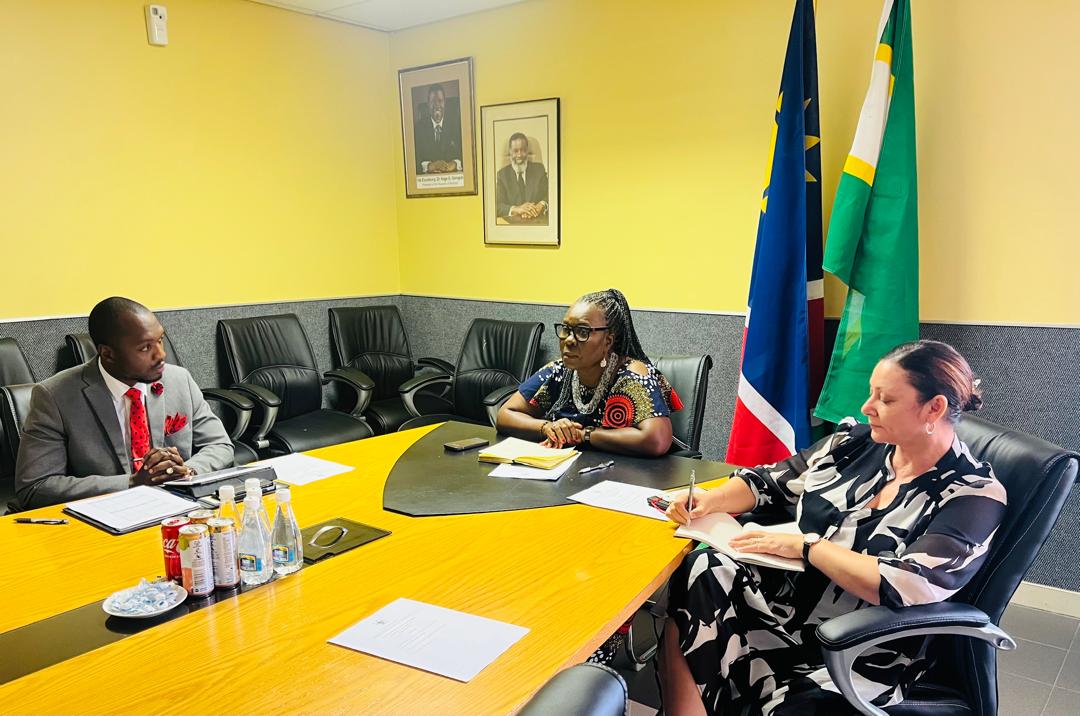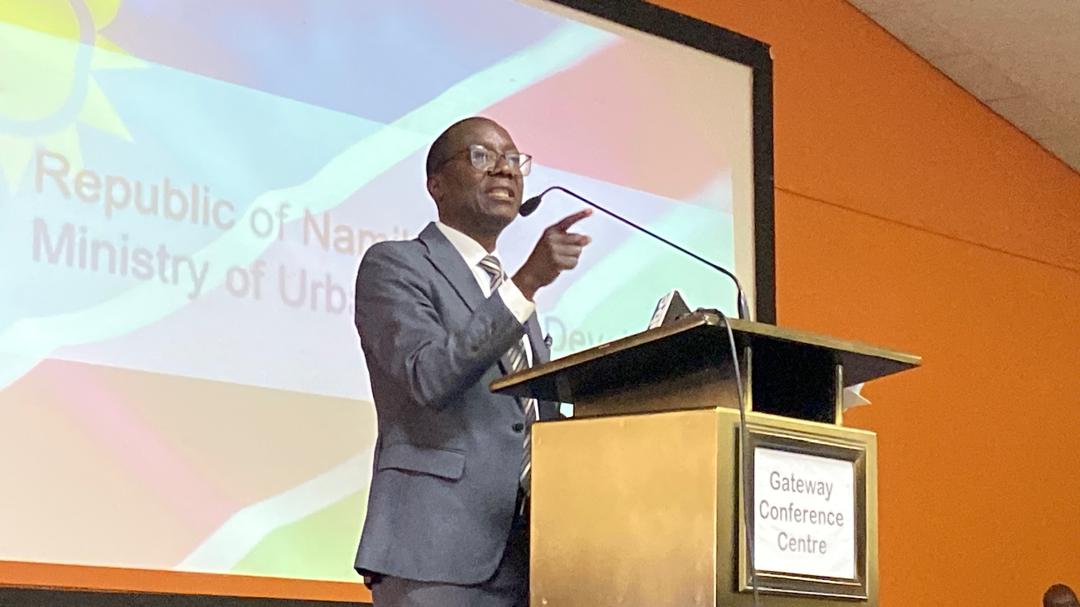IT was a time of both excitement and relief for the thirsty people Xoboxobos, when a surprise visit from Minister of Trade and Industry Erkki Nghimtina and Okorusu Fluorspar Mine.
MD Mark Dawe, brought six huge mobile water containers to provide the camp with at least 2000 litres a week. The approximately 200 informal gemstone and semi-precious stone miners from the mountainous camp used to buy their water from an Uis businessman who drove to the camp at least twice a week to sell water at N$20 for five litres.The containers were handed to them on Monday of this week.The miners live and work about 70 km away from the small village town of Uis, in Xoboxobos, an isolated camp with housing units of corrugated iron sheets and plastic materials, and no provision for basic necessities like water and electricity or services such as shops.The residents usually travel on foot to Uis in order to access health services at clinics or foodstuffs at supermarkets.At first glance it almost appeared as if time has stopped for the Xoboxogos residents, because even given the pressing issues they are faced with, many seem to have just accepted life the way it is.All they say they want is to sell their gemstones at good prices that would in the end afford them a better standard of living.On the way to the camp a group of women were spotted hitch-hiking to the nearest main road where they hoped to get transport to the nearest town and in turn to catch the bus and travel to northern Owamboland for the mopane worm season at this time of year.Lydia, who has lived in the camp most her life said that since the tourist influx at the campsite is currently at low ebb, she decided on a trip to up north to collect mopane worms which she would sell later in Windhoek and Walvis Bay where the demand for such delicacies is high.In Xoboxobos the burning sun seems ever-present, and while most other parts of the country have now received copious rains, residents of Xoboxobos recall only having received light rain showers in the last week, which appear to have mainly benefitted the Welwitschia and the poisonous Euphorbia plants that are widely spread across the rocky landscapes.Xoboxobos is a place where many of its residents have given up the hopes of searching for any sort of formal employment in the cities, and have instead opted to head for the rocky mountains to dig for gems and semi-precious stones which are then sold on the roadsides to interested tourists.Jacob Paulus (47) who hails from Okongo in the Ohangwena region, came to the camp in 1981.He says although times are hard and the gems they dig for only earn enough to cater for day-to-day basic needs such as food and water, he will remain in the camp because it has become a home to him.”I cannot go back to the north.What will I do there? I don’t want to go back and end up a criminal.Here we know each other and although at times there is no profit and nothing to eat, we help each other out, and we are very close..”he says.According to Paulus, at times it could take months before one dug up the kind of stones favoured by tourists.”The mining is not easy anymore.We can only dig up to a certain extent because the deeper we dig the harder it gets.The rocks are very hard now,” Paulus says.The gem mining community also feel cheated by local gem collectors who, they say, buy their collections at very low prices just to sell them for bigger sums down the line.Alfeus Shihepo, who has lived in the camp since 1995, shares the same sentiments as Paulus.He spends his time digging for gems while his children are in school at Uis.He says life could be better for the small miners if there could be a way of finding out the value of their stones which they are often forced to sell at low prices due to food and other basic needs.”When people come to us for stones sometimes one needs money ..and we end up selling our most profitable stones for peanuts.We have seen in many of the shops in the city that these stones are sometimes sold for up to N$10 000,” he said.Martha and Ras Greef have been mining stones for the past 17 years.They live outside Xoboxobos camp with their three children.They say they are satisfied with gem mining though it has its ups and downs.Luckily for them they have established international connections whereby their stones are directly sold to buyers on a fixed price.They claim other informal miners distrust them and are not willing to take their advice mainly because they are white.”This business can be profitable for everyone; however people here are operating individually – ‘everyone for themselves’ – and that makes it difficult for them,” says Ras.According to the Ministry of Mines and Energy’s Director Linus Mulele, Government will only be able to assist if all informal miners organise themselves into cooperatives or associations and thereafter they could submit project proposals for analysis which, if accepted, could be submitted for funding.But despite their very hard and thirsty existence, the small miners were all very happy with the donation which means that they now at least have regular access to one of their most basic needs which has been in short supply up to now, namely water.They expressed their thanks to the Okorusu Fluorspar MD, Mark Dawe, for the welcome gift.The approximately 200 informal gemstone and semi-precious stone miners from the mountainous camp used to buy their water from an Uis businessman who drove to the camp at least twice a week to sell water at N$20 for five litres.The containers were handed to them on Monday of this week.The miners live and work about 70 km away from the small village town of Uis, in Xoboxobos, an isolated camp with housing units of corrugated iron sheets and plastic materials, and no provision for basic necessities like water and electricity or services such as shops.The residents usually travel on foot to Uis in order to access health services at clinics or foodstuffs at supermarkets.At first glance it almost appeared as if time has stopped for the Xoboxogos residents, because even given the pressing issues they are faced with, many seem to have just accepted life the way it is.All they say they want is to sell their gemstones at good prices that would in the end afford them a better standard of living.On the way to the camp a group of women were spotted hitch-hiking to the nearest main road where they hoped to get transport to the nearest town and in turn to catch the bus and travel to northern Owamboland for the mopane worm season at this time of year.Lydia, who has lived in the camp most her life said that since the tourist influx at the campsite is currently at low ebb, she decided on a trip to up north to collect mopane worms which she would sell later in Windhoek and Walvis Bay where the demand for such delicacies is high.In Xoboxobos the burning sun seems ever-present, and while most other parts of the country have now received copious rains, residents of Xoboxobos recall only having received light rain showers in the last week, which appear to have mainly benefitted the Welwitschia and the poisonous Euphorbia plants that are widely spread across the rocky landscapes.Xoboxobos is a place where many of its residents have given up the hopes of searching for any sort of formal employment in the cities, and have instead opted to head for the rocky mountains to dig for gems and semi-precious stones which are then sold on the roadsides to interested tourists. Jacob Paulus (47) who hails from Okongo in the Ohangwena region, came to the camp in 1981.He says although times are hard and the gems they dig for only earn enough to cater for day-to-day basic needs such as food and water, he will remain in the camp because it has become a home to him.”I cannot go back to the north.What will I do there? I don’t want to go back and end up a criminal.Here we know each other and although at times there is no profit and nothing to eat, we help each other out, and we are very close..”he says.According to Paulus, at times it could take months before one dug up the kind of stones favoured by tourists.”The mining is not easy anymore.We can only dig up to a certain extent because the deeper we dig the harder it gets.The rocks are very hard now,” Paulus says.The gem mining community also feel cheated by local gem collectors who, they say, buy their collections at very low prices just to sell them for bigger sums down the line.Alfeus Shihepo, who has lived in the camp since 1995, shares the same sentiments as Paulus.He spends his time digging for gems while his children are in school at Uis.He says life could be better for the small miners if there could be a way of finding out the value of their stones which they are often forced to sell at low prices due to food and other basic needs.”When people come to us for stones sometimes one needs money ..and we end up selling our most profitable stones for peanuts.We have seen in many of the shops in the city that these stones are sometimes sold for up to N$10 000,” he said.Martha and Ras Greef have been mining stones for the past 17 years.They live outside Xoboxobos camp with their three children.They say they are satisfied with gem mining though it has its ups and downs.Luckily for them they have established international connections whereby their stones are directly sold to buyers on a fixed price.They claim other informal miners distrust them and are not willing to take their advice mainly because they are white. “This business can be profitable for everyone; however people here are operating individually – ‘everyone for themselves’ – and that makes it difficult for them,” says Ras.According to the Ministry of Mines and Energy’s Director Linus Mulele, Government will only be able to assist if all informal miners organise themselves into cooperatives or associations and thereafter they could submit project proposals for analysis which, if accepted, could be submitted for funding.But despite their very hard and thirsty existence, the small miners were all very happy with the donation which means that they now at least have regular access to one of their most basic needs which has been in short supply up to now, namely water.They expressed their thanks to the Okorusu Fluorspar MD, Mark Dawe, for the welcome gift.
Stay informed with The Namibian – your source for credible journalism. Get in-depth reporting and opinions for
only N$85 a month. Invest in journalism, invest in democracy –
Subscribe Now!









